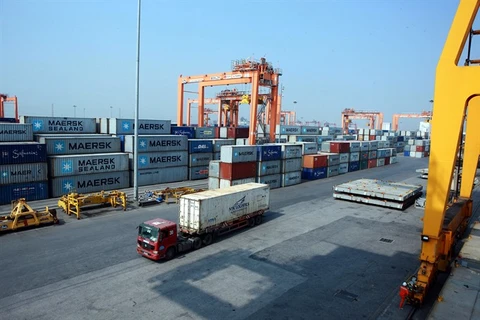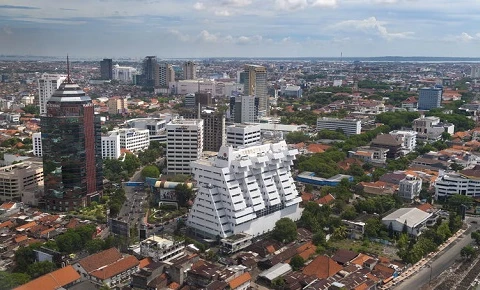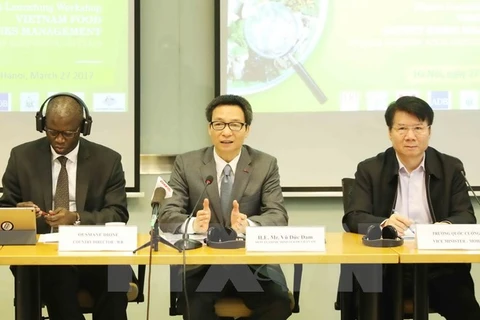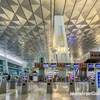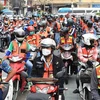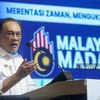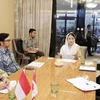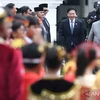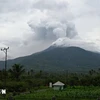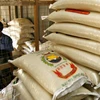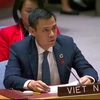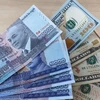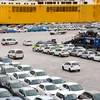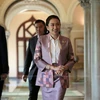Hanoi (VNA) - Large developing economies in Southeast Asia, including Vietnam, will likely expand slightly faster in 2017-18, thanks to robust domestic consumption, a gradual recovery in the global economy and commodity prices, the World Bank (WB) said in its East Asia and Pacific Economic Update report.
As a whole, the economies of developing East Asia and Pacific are projected to expand at 6.2 percent in 2017 and 6.1 percent in 2018, the report said.
Vietnam can maintain a stable growth speed over the longer term if the country continues accelerating the restructuring to support its productivity-based growth model, it noted.
Vietnam’s economy was forecast to be stable in the coming time, with GDP growth expected to expand gradually in 2017-2019 due to high domestic demand, and the country’s export-oriented processing and manufacturing activities.
Victoria Kwakwa, WB Vice President for East Asia and Pacific said “sound policies and a gradual pickup in global economic prospects have helped developing countries in East Asia and Asia-Pacific sustain growth and reduce poverty.”
However, she noted that the regions’ countries will need to reduce fiscal vulnerabilities while improving the quality of public spending and fostering global and regional integration if they want to sustain this resilience.
Meanwhile, Sudhir Shetty, Chief Economist of the WB’s East Asia and Pacific Region, underlined the role played by policy makers in taking proper solutions to significant global uncertainties and domestic vulnerabilities.
“Policy makers should prioritise measures that counteract global risks threatening the availability and cost of external finance, as well as export growth” he said, adding that efforts should also be made to strengthen policy and institutional frameworks to spur increases in productivity.
The report said growth in the region will continue to be driven by strong domestic demand, recovering global economy and rising material prices.
Rising employment and incomes in the region is expected to pull more people out of poverty in the near term, it added.
The report calls for macroeconomic prudence to address the significant risks to the region’s economic prospects.
Across the region’s large economies, increasing fiscal revenues can help governments finance programs that boost growth and foster inclusion while reducing risks to fiscal sustainability, the report said.
In addition, the report says policy makers should look forward to a more sustainable growth by take steps to reduce pollution caused by the intensive agriculture in the region.-VNA
As a whole, the economies of developing East Asia and Pacific are projected to expand at 6.2 percent in 2017 and 6.1 percent in 2018, the report said.
Vietnam can maintain a stable growth speed over the longer term if the country continues accelerating the restructuring to support its productivity-based growth model, it noted.
Vietnam’s economy was forecast to be stable in the coming time, with GDP growth expected to expand gradually in 2017-2019 due to high domestic demand, and the country’s export-oriented processing and manufacturing activities.
Victoria Kwakwa, WB Vice President for East Asia and Pacific said “sound policies and a gradual pickup in global economic prospects have helped developing countries in East Asia and Asia-Pacific sustain growth and reduce poverty.”
However, she noted that the regions’ countries will need to reduce fiscal vulnerabilities while improving the quality of public spending and fostering global and regional integration if they want to sustain this resilience.
Meanwhile, Sudhir Shetty, Chief Economist of the WB’s East Asia and Pacific Region, underlined the role played by policy makers in taking proper solutions to significant global uncertainties and domestic vulnerabilities.
“Policy makers should prioritise measures that counteract global risks threatening the availability and cost of external finance, as well as export growth” he said, adding that efforts should also be made to strengthen policy and institutional frameworks to spur increases in productivity.
The report said growth in the region will continue to be driven by strong domestic demand, recovering global economy and rising material prices.
Rising employment and incomes in the region is expected to pull more people out of poverty in the near term, it added.
The report calls for macroeconomic prudence to address the significant risks to the region’s economic prospects.
Across the region’s large economies, increasing fiscal revenues can help governments finance programs that boost growth and foster inclusion while reducing risks to fiscal sustainability, the report said.
In addition, the report says policy makers should look forward to a more sustainable growth by take steps to reduce pollution caused by the intensive agriculture in the region.-VNA
VNA

